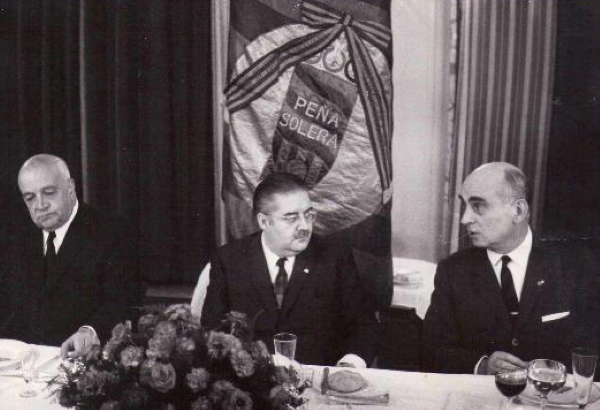As explained in the previous chapter, as president of the Penya Solera, Nicolau Casaus had a lot of influence. He was almost a board member of the Club despite not holding any position, he followed the team in almost every trip and had friendships with the new players and with the veterans who were already, or had been, within the penya. He also gained a lot of popularity among the fans because he appeared in several interviews and in the media. Contradictorily, when he finally became vice-president of FC Barcelona after the 1978 elections, he always declared that the penyes had to be an unconditional support and never an external power of the Club. The problem was that these statements were never aligned with his actions while he was president of Penya Solera.
In his golden age, the 1950s, the atmosphere in the penya was extremely relaxed and very often they were seen with fans of Espanyol and other Catalan clubs in a climate of healthy camaraderie. Above all, they were always looking for playful experiences of life, as Frederic Porta explains in his Barça Inèdit: “The members dressed up for Carnival (forbidden during Franco’s regime by imposition of the Catholic Church) and went on a tour of the cabarets. On the way, they picked up an abandoned donkey and, after driving around the city with the animal in tow of a Topolino, they took it up to the penya’s premises in the Urquinaona tower, with the consequent scandal of the neighbors”.
Casaus as vice-president
In 1978, Nicolau Casaus was appointed vice-president of FC Barcelona within the board of Josep Lluís Núñez and, thirteen years later, in the midst of a strong decline, the Penya Solera Barcelonista was dissolved. It did so leaving behind a whole history of impulses not without controversy, but, above all, a blaugrana legacy that has served as a launching pad for the current supporters’ clubs movement.
During his tenure, some facts and anecdotes stand out, as journalist Josep Maria Ducamp explains in an article published on August 10, 2007 in El Periódico:
“On one occasion we went together, I think it was in Arenys, to intervene in a colloquium. We both went in the car of the president Agustí Montal, accompanied by Julián Mir, who was my director at the newspaper ‘Dicen’. That night, Montal gave me a watch with the FC Barcelona crest on it and Casaus, looking at it sideways and with indestructible Britishness, whispered to the president: ‘I don’t have it’”.
Casaus could not stand for election during the Franco era because of his political past and also because of the sentence he was given, although on more than one occasion it was proposed to him.
As Ducamp explains, his knowledge of the whole social environment of Barça, and even of sport in general, led him to “advise certain guidelines of behavior to those boards to which he was not akin, but rather a firm opponent. On one occasion, Barça was asked to visit Franco in a special audience, and Casaus advised them to take Samitier with them. They ignored him. They went to Madrid and when the door opened to the hall where the blaugrana leaders were waiting and the Head of State appeared, the first thing he asked was: ‘What about Pepe, didn’t Pepe come? Franco was devoted to Samitier, who was one of the few in the whole regime who dared to joke with him. Days later, they had to send Samitier with the captain of the Cinco Copas, Marià Gonzalvo.”
Lights and shades with the boards of directors and penyes
It is evident that, when Ducamp speaks of the “boards to which he was not akin”, he is referring specifically to Agustí Montal Galobart, the president of the Cinco Copas. He was also opposed to Enric Llaudet and Agustí Montal y Costa, already in the 60s and 70s. As for the boards with which he had affinity, it is also explained that the president Narcís de Carreras, in 1968, rewarded him by authorizing him to officially represent the Club in events with members and supporters.
With fervent admirers and firm critics against his figure, Nicolau Casaus spent 22 years as vice-president under the presidency of Josep Lluís Núñez, and it must be recognized that he has never gone unnoticed. On the one hand, he was a staunch defender of the penyes, but on the other he was totally opposed to recognizing any grouping, federation or confederation of these, considering that only with the treatment “penya to penya” could any mutiny against the board of directors of the moment be avoided. These are lights and shades of a figure that has gone down in the history of FC Barcelona and its penyes.






